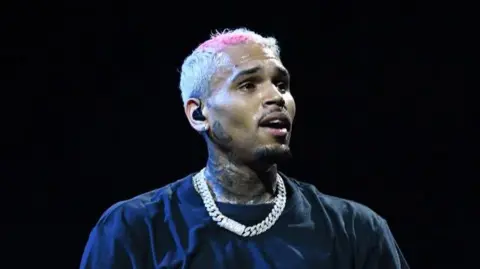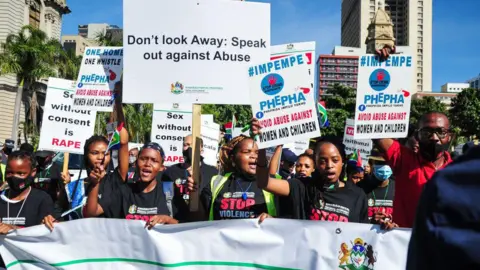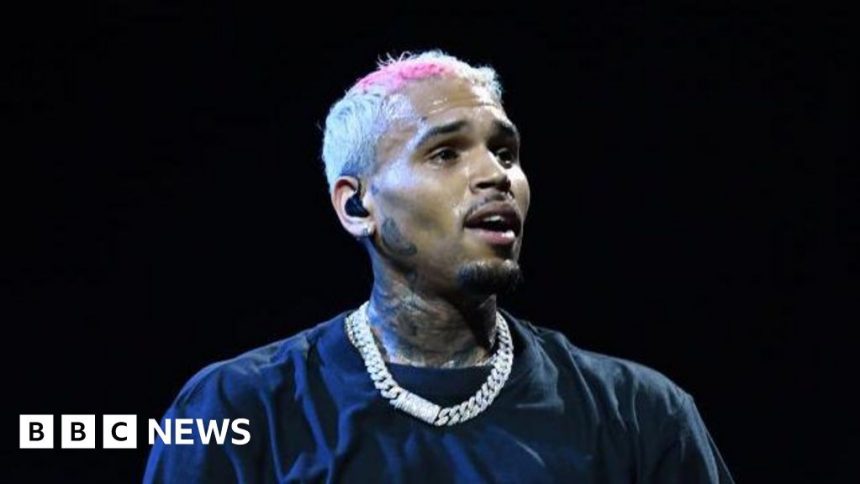Chris Brown concert shines spotlight on violence against women in South Africa
 Getty Images
Getty ImagesChris Brown’s forthcoming concert in South Africa has led to renewed focus on the country’s shocking levels of violence against women, with campaigners saying it sends the wrong message given his history of abuse.
In less than two hours, the Grammy-winner managed to sell out tickets to the FNB Stadium in Johannesburg – the largest stadium in Africa with over 94,000 seats. Demand was so high that a second December date was added.
Despite the massive interest, the R ‘n’ B star has experienced a backlash from people who did not want him to perform due to his violent past.
“When I saw the news that Chris Brown was coming to South Africa, I was shocked and deeply disappointed,” said Sabina Walter, executive director of Women for Change, an organisation that advocates for the rights of women and children in South Africa.
The group has started a petition to stop the US artist from performing. It currently has over 20,000 signatures.
“The petition was started to send a strong message that we will not tolerate the celebration of individuals with a history of violence against women,” said Ms Walter, especially in a country like South Africa.
South Africa has one of the highest rates of femicide and gender-based violence in the world.
A rape is reported in the country roughly every 12 minutes and it is assumed that many more go unrecorded.
“When someone like Chris Brown is given a platform in a country where GBV is at crisis levels, it sends a damaging message – that fame and power outweigh accountability,” said Ms Walters.
The most well-known instance in Chris Brown’s history of abuse is the domestic dispute with singer Rihanna in 2009.
Chris Brown, who was 19 at the time, pleaded guilty to assault and was sentenced to five years probation, community service and domestic violence counselling.
Although Rihanna forgave him and the pair briefly dated again after the incident, Chris Brown has also been accused of violence by other women – and men.
Women for Change says it wants to know how the Department of Home Affairs could grant “a convicted abuser” a visa.
For Ms Walter, the decision is “concerning and indicative of a systemic failure”.
According to South African law, having a previous conviction can result in a visa being denied. But there can be an exception for “good cause” and those are cleared by the Director General of the Department of Home Affairs.
Chris Brown has previously been banned from entering other countries, including the United Kingdom, Australia, Canada, and New Zealand, although he has subsequently gone on to play in the UK and elsewhere in Europe.
But his South African fans are undeterred.
 Getty Images
Getty ImagesFormer University of Cape Town vice-chancellor Prof Mamokgethi Phakeng shared on X that she would be attending the Chris Brown concert.
“I am totally against GBV and condemn it. I believe that those who perpetrate GBV should face the full might of the law without exceptions or leniency.
“But let me be clear, just in case the message didn’t sit well: I am going to attend Brown’s concert if he comes. These two things are not mutually exclusive.
“To suggest that enjoying a concert aligns you with every past action of the artist is, at best, simplistic and, at worst, intellectually dishonest,” she said.
Prof Phakeng explained that “music is bigger than the individual”.
She added that boycotting Chris Brown’s concert wouldn’t end GBV in South Africa.
“Attending the concert does not magically erase our moral stance on GBV.”
- Oscar Pistorius release: A reminder of South Africa’s femicide problem
- Sexual violence in South Africa: ‘I was raped, now I fear for my daughters’
Although this is not Chris Brown’s first concert in South Africa, there is huge excitement among his fans.
One said on X: “Chris Brown coming to South Africa??… I’ll take a loan for a meet & greet.”
“Chris Brown you don’t know us yet… but my wife and I will be those two microscopic fans in the stands singing and dancing to every jam!!!!” said another.
Ms Waters said she had even received threats because of her campaign against the US star.
“Supporters of Chris Brown seem ready to defend him at any cost,” she said.
“The criticism we are facing for our petition speaks volumes and actually reveals a deep disconnect in how we, as a society, view violence against women.”
She said that too often people were willing to “excuse abusive” behaviour when it comes to celebrities they admire.
Selective outrage is dangerous because it perpetuates the rape culture and high levels of violence women face every day, said Ms Walters.
President Cyril Ramaphosa accepts that South Africa has a huge problem with gender-based violence and in August, he called on the country’s men to take a stand.
“Our ultimate goal is to end gender-based violence altogether,” he said.
Yet this goal remains a distant one – little has changed five years after he called for action to tackle the country’s “rape crisis”.
This year alone, Women for Change has honoured over 200 women who have lost their lives to femicide.
“This fight isn’t just about this concert. It’s about changing the narrative in South Africa, where abusers are held accountable and where violence against women is never excused, overlooked, or forgotten.”
More South Africa stories from the BBC:
 Getty Images/BBC
Getty Images/BBCGo to BBCAfrica.com for more news from the African continent.
Follow us on Twitter @BBCAfrica, on Facebook at BBC Africa or on Instagram at bbcafrica








